Used Cows for Sale. The sign will lead me to Emory Tucker’s house, or at least that’s what I’ve been told. Emory is my father’s first cousin. My driving directions are scant, nothing more than a few confusing words I scribbled down when I first called Emory to ask about exploring his land. Hahira. Truck Stop. Left. Left. Brick house. Left. Behind the pond. He gave detailed directions, but I didn’t catch much of it.

My friend Licia Nicholson is supposed to meet Hal Sutton and me for a day of grave hunting. It’s my hobby. I enjoy the thrill of finding something in the woods, of uncovering a bit of history, of discovering old graves. We have plans to park our vehicles near the interstate and take Hal’s vehicle. Our destination is somewhere in the boonies near Morven, a place I’ve never been.
Before leaving home, I make a quick phone call to Emory and repeat the directions to him. I want to be sure I’m not going to get us lost. The phone is breaking up and he’s not hearing me. “Yeah Brenda. You’ll see the sign. Used Cows For Sale. We’re back here in the pasture.”
I grab my camera, notes, purse, and car keys and head out through the art studio where my husband’s bridge club members are examining their card hands. My husband calls to me, “Watch for snakes.”
I’m good about watching for snakes. I’ve come across many while traipsing through the countryside, but I’ve never taken a bite. Most of the time I wear my husband’s Vietnam combat boots and call them my snake boots. The boots weigh as much as a grown man.
Hal drives down country roads, and nothing around us lines up with my pathetic directions. It doesn’t take long for me to realize my friends have not a lick of faith in my directions. Hal mumbles about my lack of planning and decides to use the GPS. It is soon obvious that I’ve led them down the wrong road. My notes show that we should turn left, and Hal says that it would help to know where to turn left. Of course the GPS can take us only so far back here. At some point we are on our own and in the middle of nothing familiar. We ride down a quiet road so long I fear we might end up in Florida. Spanish moss hangs from trees like freshly brushed witch’s hair. We are wasting gas and I haven’t written down decent directions. Hal, a military man, is unaccustomed to a lack of planning, and I’m getting nervous. Licia, in the back seat, seems calm, as though she knows we’ll find the place before we die.
Somewhere near Morven, we come up on two young men working on a sign at a peach orchard. They are standing near the road. I say, “Hal, let’s stop here and I’ll ask them for directions.” I want to make up for the mess I’ve made.
Stumbling out of the high truck, I catch my balance and approach the men. “Are y’all from around here?”
Their eyes walk across my sweaty, sun-ripened face, trying to place me, probably knowing I can’t possibly be from Morven. I’m sure they notice my husband’s size 10 army boots on my feet. The boots clomp with every step I take.
“Yep,” one of them says in response to my question. Short and sweet and to the point. Just yep. I take it to mean he’s from around here.
Determined to get directions, I leave the silence of their abrupt answer hanging in the air for no more than a moment before filling the void with another question. “Do you know where Emory Tucker lives?”
“Emory Tucker,” says the youngest one. “Didn’t he die?”
“Unless he’s died in the last couple of hours, I don’t think so. I spoke to him this morning on the phone and he was still alive.”
Hal and Licia watch the exchange from the truck. They are likely enjoying my discomfort.
“He has a sign on his property that says used cows for sale.”
“Well yeah. I suppose Emory does have some used cows. He sure does.” The man smiles. “Sure does. I think all his cows might be used.” His face is tanned. “His place is about a mile down the road, back in the pasture. You’ll see the sign. Used cows for sale.”
I climb back into the truck with some decent directions. A few minutes later we spot the sign, Hal pulls over and stops so we can take photos. Behind the sign is a pasture, and behind the pasture is a pond rich with cypress trees, and behind the pond is Emory’s house.

Emory is outside when we arrive. He hugs me and says that I’m starting to look like Aunt Mary Eliza. She was his aunt and my grandmother, my father’s mother. Emory introduces me to his wife, Jeanette, and they take us inside a screened room for an icy cold root beer. Jeanette is an attractive and sweet woman. She makes us feel comfortable in her home.


A huge hornet’s nest hangs from the ceiling. A cooler in the corner reads: Used Cows for Sale. Tobacco pipes are spread over the table where we sit.

Emory offers to give us a lift to the woods on his golf cart. The cart seats Emory, me, and Licia, all squished in together. Hal has no choice but to stand in the back, forward facing, leaning over the hood of the cart. He can’t sit because the rear of the cart is filled with items.

Emory takes off toward the woods. Seconds before barreling under a low hanging limb, he yells to Hal, whose head is sticking up, “Duck!” Then he laughs, a soft chuckle that goes a long way. I’m reminded of my father, a man of laughter. If Hal hadn’t ducked, we might have spent the rest of the day in the emergency room.
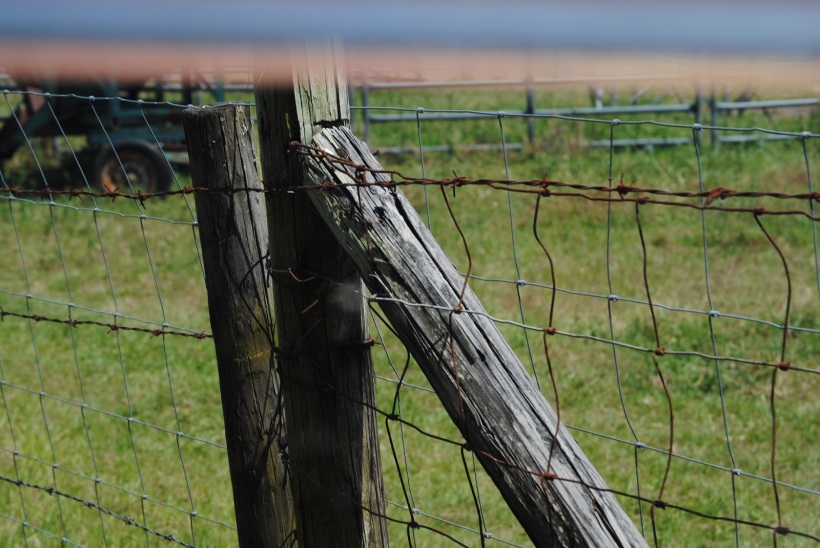
Danger comes at us again and again. Several times, Emory yells, “Duck!” Hal, dodging limbs, somehow avoids decapitation. Emory drives like a man who has some place to go and he doesn’t care if he gets there dead or alive. Licia and I do care, though. We exchange wide-eyed glances. If I’d known we were going deep in the woods on a golf cart with a maniac driving I’d have taken out some life insurance before leaving home. Lord knows the man takes us to the brink of death.

When the golf cart comes to a halt at the edge of the forest, we’re bruised and battered from the ride. And Hal is in one piece. This is as far as the wheels will take us. The rest we’ll make on foot. Earlier in the day, the sun seemed to be burning a hole in the sky, but now, the woods provide a canopy of luscious green shade. Licia whispers to me that we have walked into a jungle of poison ivy.

Unable to recognize the vine, I ask, “Emory is this poison ivy?”
“Nah.” He’s wearing shorts, a cut off shirt, and brogans.
I believe Emory’s denial of poison ivy until Licia whispers with urgency, her eyes widening, “It is, Brenda. There’s poison all around us.”
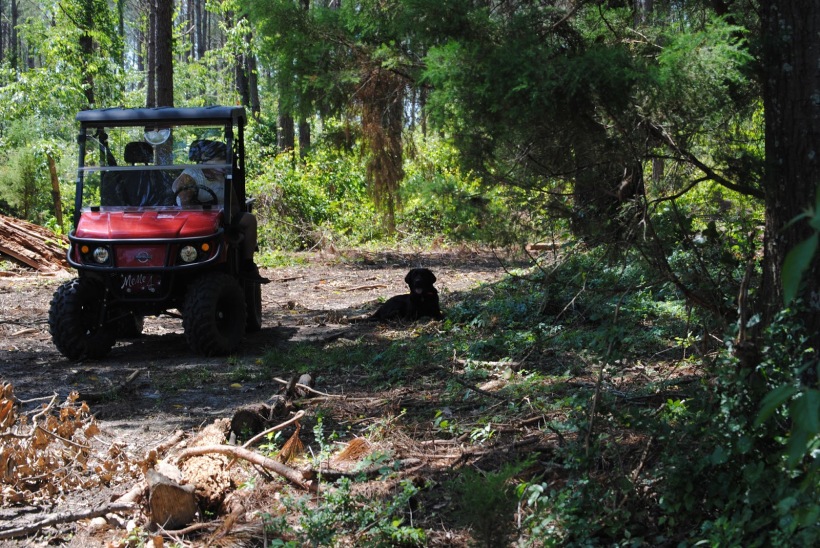
Hal cautions me not to touch the sumac. I don’t know what sumac looks like either, but I’m being told I’m surrounded by the stuff.
We wade through poison sumac and poison ivy and poison oak and grape vines. Our boots tangled in vines, we free ourselves again and again, moving forward. Every now and again, Licia reminds me not to touch the greenery. According to her, the woods are infested with poison.

Using tobacco sticks provided by my husband who is at home playing bridge while we fight for our lives, we beat our way through thick brush. I make a lot of noise in an attempt to shoo off any snakes that might be in my path. Our boots crunch rotten limbs the shape and color of snakes. Smiling, Emory leads us deeper into the forest without ever looking down. By now, he and Hal are so far ahead of me I lose sight of them. Licia is nearby, close enough to remind me that we’re walking through poison.
At last, sweat dripping from our faces, sweat blurring our vision as it slips over our eyes, we discover graves wrapped in a shroud of silence. Betty Nelson, 1828 – 1858. Ira Nelson, Infant.
Emory explains that Mr. Nelson, an African American, comes to the land now and then to visit the graves of his ancestors. I think of how Mr. Nelson’s people lived close to the earth yet could not put down roots until their bodies had been planted in the ground. They had no freedom, no land to call their own.
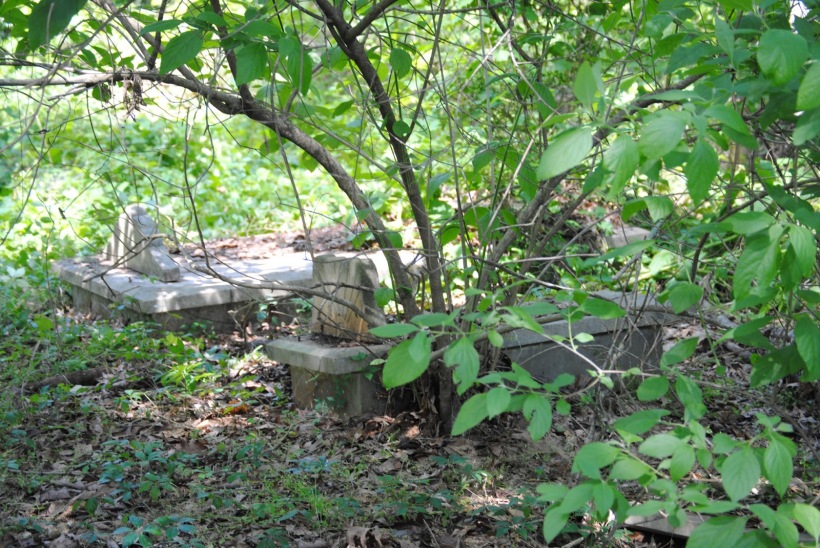
The growth is so thick we can’t locate all the graves. I imagine the thumping heartbeats of the past beneath my boots. Emory tells us there are more graves, some being swallowed by the earth. Many are lost at this time of the year, their graves strangled beneath a jungle of vines. Emory encourages us to come back after frost hits. Without the greenery, we’ll be able to see and touch the land and the graves.
Emory Tucker, son of J.P. Tucker and Ella Mae Tucker, is a man not to be forgotten. He drives like a prisoner escaping from jail taking us into the woods, and he drives with suicidal and homicidal tendencies taking us out. At one point, the golf cart nearly flips, the tires on one side lifting as our vision tilts. Hal reacts quickly from the back, throwing his weight to the opposite side to balance the cart. Licia and I make every effort to remain calm, but I need a strong drink of moonshine to calm my nerves. Driving the cart painfully close to obstacles, Emory turns at the last second, and my face nearly collides with rusty nails driven into wooden posts. Emory’s soft laughter surrounds us. I think of Satan with a sense of humor. Dear God, please keep us safe.
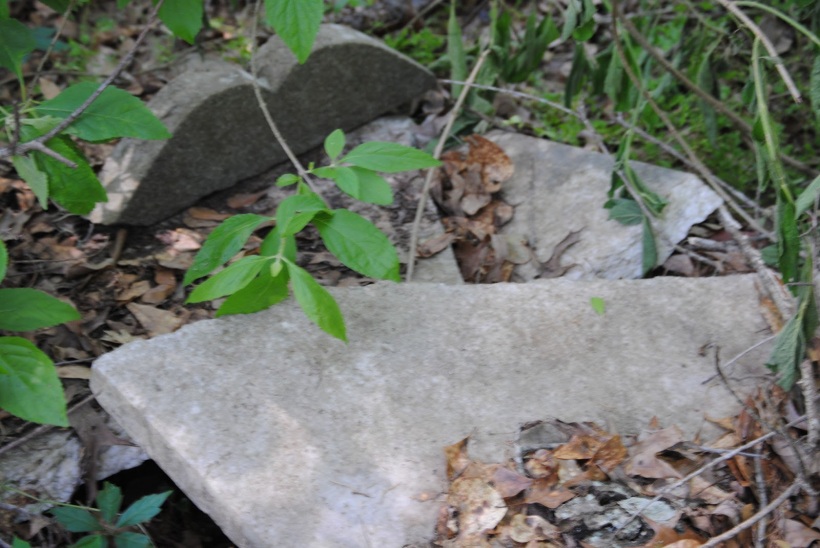
When the day is over, the three of us leave Emory and Jeanette behind. We take home yellow tee shirts with Tucker’s Place printed on the front and Used Cows for Sale on the back. We take home an obsessive fear of rash covering our flesh before the night is over. We take home photos of graves hidden in the woods. We take home the taste of icy root beer on our tongues. We take home memories that will warm us for months to come. I cannot speak for the others when it comes to this, but I take home the experience of finding something sacred and peaceful. I take home a burning desire to discover the locations of more slave graves, the burial spots of people who watered our crops with their sweat and nursed many a white baby on their breasts.

We take home the mischievous smile of Emory Tucker tattooed forever on our hearts.
Brenda Sutton Rose is the author of Dogwood Blues.
ABOUT DOGWOOD BLUES
Change has come to Dogwood, Georgia, dividing the town, friends against friends, neighbors against neighbors. With the liquor referendum on the ballot, signs, declaring VOTE YES, others declaring VOTE NO, many signs as tall as billboards, pop up in yards throughout the city limits. All of Dogwood has an opinion. And the local newspaper, Dogwood News, reports it all.
When Boone Marshall , a blues musician who inherits the family farm after his father’s death, brings home a new bride not long after his first wife’s suicide, Nell Sauls, the town busybody, goes bat crazy spreading rumors that have no substance. And when Kevin Kilmer, award-winning author, moves back to Dogwood, the town where he’d grown up, and brings with him a husband, Nell makes it her business to drop gossip like bird poop up and down the historic district.
Compared to Fried Green Tomatoes at the Whistle Stop Cafe, to Cold Sassy Tree, and to the movie Steel Magnolias, Dogwood Blues is as southern and true as a story can be.
DOGWOOD BLUES by Brenda Sutton Rose was nominated for a 2015 Georgia Author of the Year Award for First Novel. She has been the guest at numerous books clubs that chose Dogwood Blues as their book for the month. She has taught writing workshops at conferences for new and upcoming writers. Click here to purchase Dogwood Blues.
©2010-2018 Blog Exchange Traffic All Rights Reserved
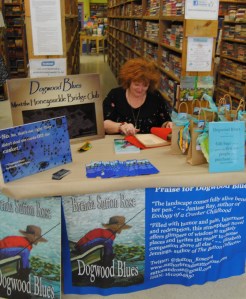
Brenda,
I’ve ridden with Richard…you should NEVER be frightened of anyone else’s driving!! LOL!
Larry Hawkins
LikeLike
Larry, He truly does drive crazy. I believe he must be worse now that’s he’s older! Brenda
LikeLike